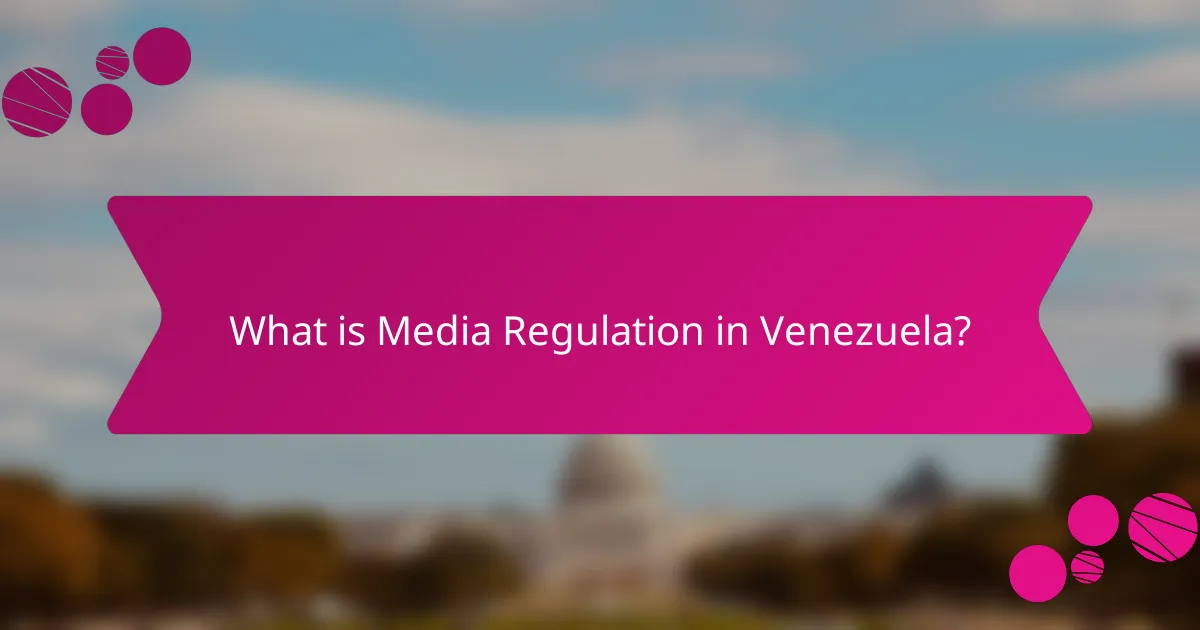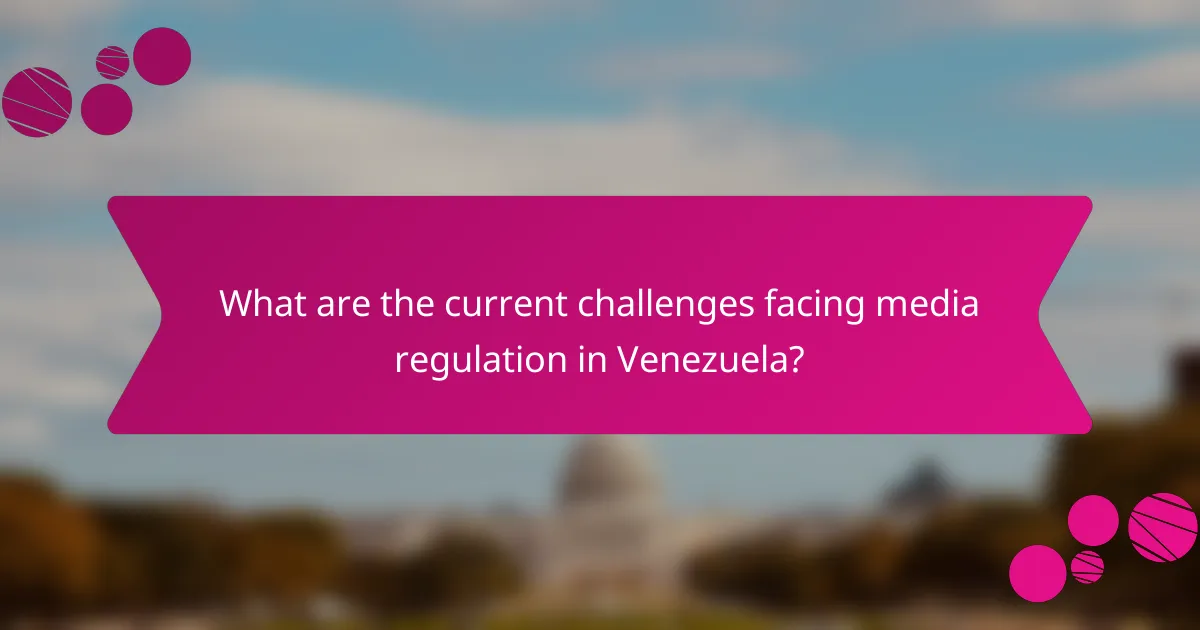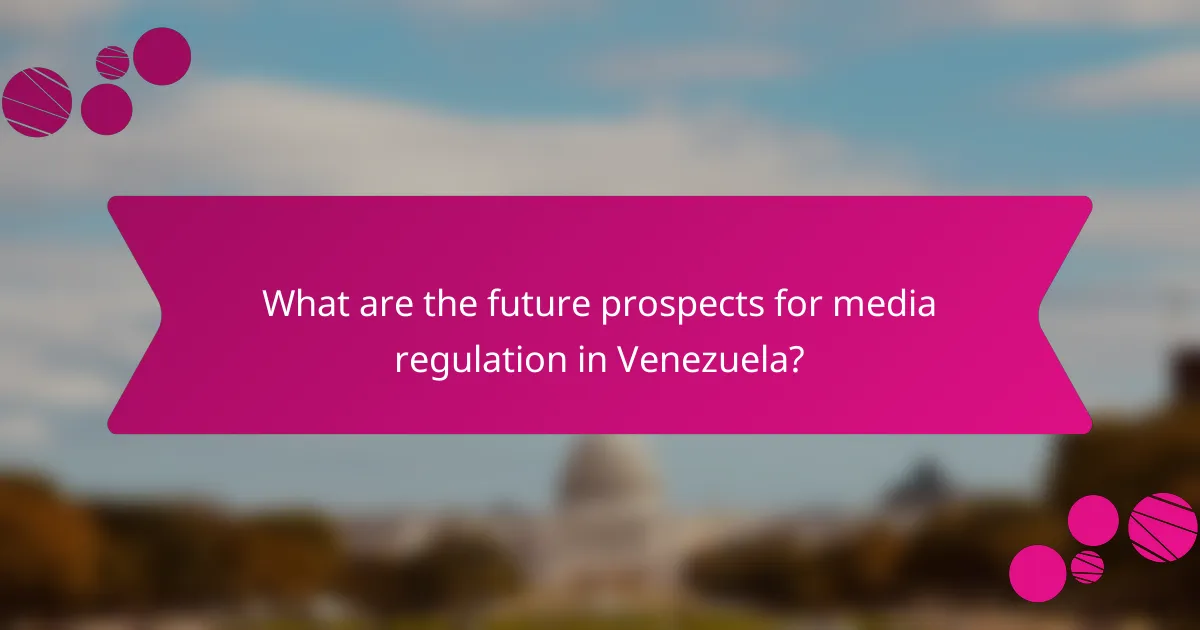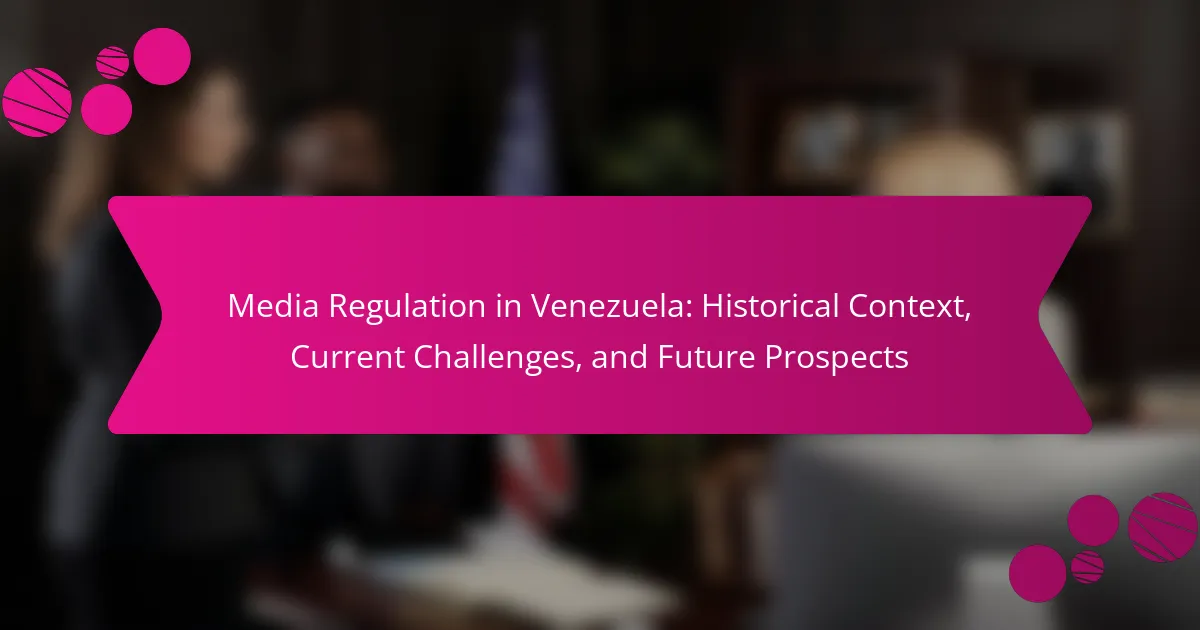
What is Media Regulation in Venezuela?
Media regulation in Venezuela refers to the laws and policies governing the media landscape. It encompasses the control and oversight of television, radio, print, and digital media. The Venezuelan government has implemented stringent regulations that restrict media freedom. These regulations often aim to limit dissenting voices and control information dissemination. For instance, the Organic Law of Telecommunications regulates broadcasting licenses and content. The law has been criticized for promoting censorship and limiting journalistic independence. Additionally, state-owned media dominates the landscape, further constraining private outlets. International organizations have highlighted concerns regarding human rights violations in this context. Overall, media regulation in Venezuela reflects a broader trend of government control over public discourse.
How has media regulation evolved in Venezuela over time?
Media regulation in Venezuela has evolved significantly, particularly since the late 20th century. In the 1990s, the media landscape was relatively free, with diverse outlets operating independently. However, the rise of Hugo Chávez in 1999 marked a turning point. Chávez’s government implemented laws to increase state control over media. The 2004 Law on Social Responsibility in Radio and Television imposed restrictions on content and mandated compliance with government directives.
Following Chávez’s death in 2013, his successor Nicolás Maduro continued these policies. The government intensified censorship and restricted access to foreign media. In 2017, new regulations further limited media freedoms, leading to the closure of numerous outlets. By 2020, Venezuela had one of the most repressive media environments in Latin America.
The evolution reflects a shift from relative freedom to stringent control, impacting journalists and media organizations significantly.
What historical events have shaped media regulation in Venezuela?
The historical events that have shaped media regulation in Venezuela include the rise of Hugo Chávez in 1999 and the subsequent implementation of the Law on Social Responsibility in Radio and Television in 2004. Chávez’s government sought to control media narratives, leading to increased censorship. The law imposed restrictions on content deemed inappropriate, impacting freedom of expression. In 2007, the government did not renew the license of the opposition-aligned channel RCTV, further tightening media control. The 2013 death of Chávez intensified these regulations under Nicolás Maduro. Protests against the government in 2014 prompted further crackdowns on media. These events collectively illustrate the evolution of media regulation in Venezuela, characterized by state intervention and suppression of dissenting voices.
How did political changes influence media laws and regulations?
Political changes significantly influenced media laws and regulations in Venezuela. The shift towards socialism under Hugo Chávez in the late 1990s led to increased government control over media. Chávez’s administration enacted laws that restricted private media ownership and increased state funding for public media. These changes aimed to promote government narratives and limit dissent.
In 2004, the Law on Social Responsibility in Radio and Television was implemented. This law imposed strict regulations on content, requiring broadcasters to align with government ideologies. The law was used to censor critical voices and enforce compliance among media outlets.
Following Chávez’s death in 2013, Nicolás Maduro continued these policies. Under his regime, media laws further tightened, with increased harassment of journalists and closure of dissenting outlets. The government also established a media monopoly through state-owned enterprises.
These political shifts demonstrate a systematic approach to using media laws as tools for controlling public discourse and suppressing opposition.
What are the key components of media regulation in Venezuela?
The key components of media regulation in Venezuela include the legal framework, state control, and censorship mechanisms. The legal framework is established by laws such as the Law on Social Responsibility in Radio and Television. This law mandates content regulations and imposes fines for non-compliance. State control is evident through the National Telecommunications Commission, which oversees broadcasting licenses. Censorship mechanisms are implemented to restrict access to certain information. Additionally, media outlets face pressure through intimidation and harassment. These components collectively shape the media landscape in Venezuela.
What types of media are subject to regulation in Venezuela?
In Venezuela, various types of media are subject to regulation. These include television, radio, print media, and online platforms. The government exercises control over these media types through laws and regulations. The Organic Law on Social Responsibility in Radio, Television, and Electronic Media is a key legislative framework. This law mandates content restrictions and imposes penalties for non-compliance. Additionally, the government has been known to censor news outlets and restrict access to information. This regulatory environment has significant implications for freedom of expression in the country.
How do regulatory bodies operate within the Venezuelan media landscape?
Regulatory bodies in Venezuela operate under the National Telecommunications Commission (CONATEL). CONATEL oversees the licensing and regulation of media outlets. It enforces laws related to telecommunications and broadcasting. The government influences these bodies, affecting their independence. Media outlets face restrictions on content deemed contrary to state interests. Regulatory actions include fines and revocation of licenses for non-compliance. International organizations have criticized these practices as violations of freedom of expression. The media landscape is characterized by censorship and limited pluralism.

What are the current challenges facing media regulation in Venezuela?
The current challenges facing media regulation in Venezuela include government censorship and restrictions on press freedom. The government controls major media outlets and restricts access to information. Journalists face harassment and intimidation for reporting on sensitive topics. The legal framework is often used to stifle dissent and limit media plurality. According to the Committee to Protect Journalists, Venezuela is one of the most dangerous countries for journalists. The lack of independent regulatory bodies further complicates the media landscape. Additionally, economic instability affects media operations and access to resources. These factors contribute to a highly polarized media environment in the country.
How do political and economic factors impact media regulation today?
Political and economic factors significantly impact media regulation today in Venezuela. The government exercises strict control over media outlets to maintain power. Political motivations lead to censorship and the suppression of dissenting voices. Economic challenges, such as hyperinflation, affect media funding and sustainability. Many independent media outlets struggle to survive financially. The government often uses economic leverage to influence media narratives. State-owned media dominate the landscape, limiting diversity in viewpoints. International sanctions and economic isolation further complicate the media environment. These factors create a challenging landscape for free expression and independent journalism in Venezuela.
What role does government censorship play in media operations?
Government censorship significantly restricts media operations in Venezuela. It limits the freedom of expression and press, impacting journalists’ ability to report. The government employs laws and regulations to control media content. These measures often lead to self-censorship among media professionals. For example, the Ley de Responsabilidad Social en Radio y Televisión mandates compliance with government standards. Violations can result in fines or closure of media outlets. Consequently, independent journalism faces severe challenges. Reports indicate that many journalists have fled the country due to repression. This environment stifles diverse viewpoints and critical reporting in the media landscape.
How has the economic crisis affected media outlets and their regulation?
The economic crisis has severely impacted media outlets and their regulation in Venezuela. Many media organizations have faced financial difficulties, leading to layoffs and closures. Advertising revenue has plummeted due to reduced consumer spending. This decline in funding has limited the ability of outlets to produce quality journalism.
Regulatory measures have also intensified during the crisis. The government has increased control over media content and distribution. Censorship has become more prevalent as authorities seek to suppress dissent. This has led to a reduction in press freedom and a lack of diverse viewpoints in the media landscape.
In summary, the economic crisis has resulted in financial strain on media outlets and stricter regulatory oversight, significantly affecting their operations and independence.
What are the implications of media regulation for freedom of expression?
Media regulation significantly impacts freedom of expression by imposing restrictions on content and access. In Venezuela, the government has enacted laws that limit media operations and control information dissemination. These regulations often lead to censorship and self-censorship among journalists and media outlets. Consequently, the public’s access to diverse viewpoints is restricted. Historical context shows that such regulations have been used to suppress dissent and maintain political power. For instance, the 2004 Law on Social Responsibility in Radio and Television has been criticized for stifling independent journalism. Therefore, media regulation can undermine democratic principles by curtailing the free exchange of ideas.
How do restrictions on media affect public discourse in Venezuela?
Restrictions on media significantly limit public discourse in Venezuela. These restrictions create an environment where dissenting voices are silenced. The government controls major media outlets, leading to biased reporting. Independent journalism faces harassment and censorship. As a result, citizens receive limited information about political and social issues. This lack of diverse perspectives hampers informed public debate. According to a 2021 report by Human Rights Watch, over 100 journalists have faced intimidation. The overall effect is a weakened civil society and reduced democratic engagement.
What are the consequences for journalists and media professionals?
Journalists and media professionals in Venezuela face severe consequences including censorship, harassment, and imprisonment. The government employs strict media regulations that limit freedom of expression. Journalists often experience threats and violence for reporting on political issues. According to the Committee to Protect Journalists, Venezuela ranks among the most dangerous countries for reporters. Many journalists are forced into exile due to these oppressive conditions. Additionally, media outlets face closure or fines for non-compliance with government regulations. These consequences significantly hinder the ability of journalists to operate freely and report accurately.

What are the future prospects for media regulation in Venezuela?
The future prospects for media regulation in Venezuela appear uncertain and challenging. The government has historically imposed strict controls on media outlets. Recent trends indicate a potential increase in censorship and regulation. The political climate remains tense, influencing media freedom. International organizations have criticized the government’s approach to media regulation. Reports suggest that independent media faces significant risks. The future may see continued restrictions unless there is political change. Overall, the landscape for media regulation in Venezuela is precarious and likely to evolve under current conditions.
How might changes in government affect media regulation moving forward?
Changes in government can significantly affect media regulation. A new administration may implement policies that alter media ownership rules. For instance, a government prioritizing free speech could reduce censorship. Conversely, a regime focused on control might increase restrictions on media outlets. Historical examples in Venezuela show that shifts in power often lead to tighter regulations. In the early 2000s, Hugo Chávez’s government imposed laws that limited press freedom. This trend can continue or reverse depending on the political landscape. Future media regulation will likely reflect the governing party’s stance on free expression and information dissemination.
What reforms are being proposed to improve media freedom?
Proposed reforms to improve media freedom in Venezuela include the repeal of restrictive laws. These laws currently limit journalistic expression and impose heavy penalties on dissent. Advocates suggest implementing new legislation that safeguards press rights. Such legislation would protect journalists from harassment and censorship. Additionally, reforms aim to enhance transparency in media ownership. This would ensure accountability and reduce government influence over media outlets. International organizations have highlighted the need for these changes. They argue that a free press is essential for democracy and public discourse.
How can international pressure influence Venezuelan media policies?
International pressure can significantly influence Venezuelan media policies by prompting changes in government regulations and practices. External entities, such as foreign governments and international organizations, often advocate for press freedom. This advocacy can lead to diplomatic negotiations that encourage the Venezuelan government to relax censorship laws. For instance, sanctions imposed by the U.S. and the European Union targeted individuals involved in media repression. These sanctions create economic incentives for the government to alter its media policies to improve international relations. Reports from organizations like Human Rights Watch highlight how international scrutiny has led to temporary improvements in media access and reduced censorship. Thus, sustained international pressure can result in measurable changes in Venezuelan media policies.
What steps can be taken to promote a healthier media environment in Venezuela?
Implementing regulatory reforms can promote a healthier media environment in Venezuela. Strengthening laws that protect press freedom is essential. Establishing independent media watchdogs can enhance accountability. Providing training for journalists can improve reporting standards. Encouraging diverse media ownership can reduce monopolies. Supporting community media initiatives can amplify local voices. Promoting digital literacy among citizens can empower informed consumption of media. These steps can foster a more balanced and transparent media landscape in Venezuela.
What role can civil society play in advocating for media rights?
Civil society can play a crucial role in advocating for media rights. It serves as a watchdog, monitoring government actions and media practices. Civil society organizations can mobilize public opinion to support media freedom. They can provide legal assistance to journalists facing persecution. Educational campaigns can raise awareness about media rights among citizens. Advocacy efforts can influence policy changes regarding media regulation. Collaboration with international organizations can amplify their impact. Historical instances show that civil society movements have successfully challenged oppressive media laws. These actions contribute to a more robust media landscape and protect democratic values.
How can technology be leveraged to support independent media?
Technology can support independent media by enhancing access to information and facilitating content distribution. Digital platforms enable independent journalists to reach wider audiences without traditional gatekeepers. Social media allows for real-time reporting and audience engagement, increasing visibility for independent voices. Crowdfunding platforms provide financial support, enabling independent media to sustain operations. Data analytics tools help media organizations understand audience preferences, tailoring content to meet their needs. Additionally, encryption technologies protect journalists from surveillance and censorship, promoting a safer environment for reporting. These technologies collectively empower independent media to operate more effectively in challenging regulatory landscapes.
Media regulation in Venezuela encompasses the laws and policies governing various media types, including television, radio, print, and digital platforms. The article explores the evolution of media regulation, highlighting significant historical events, such as the rise of Hugo Chávez and the implementation of the Law on Social Responsibility in Radio and Television, which intensified government control and censorship. Current challenges include severe restrictions on press freedom, economic instability affecting media operations, and the consequences faced by journalists. The article also examines potential future prospects for media regulation in Venezuela, including the influence of political changes and international pressure, as well as proposed reforms aimed at improving media freedom.
